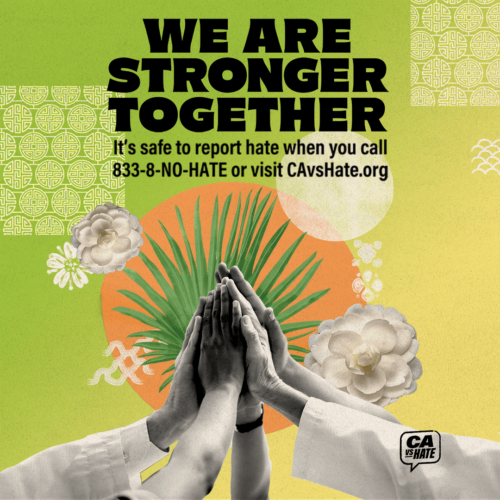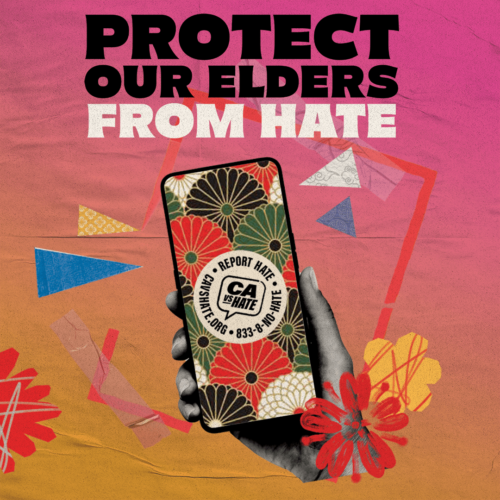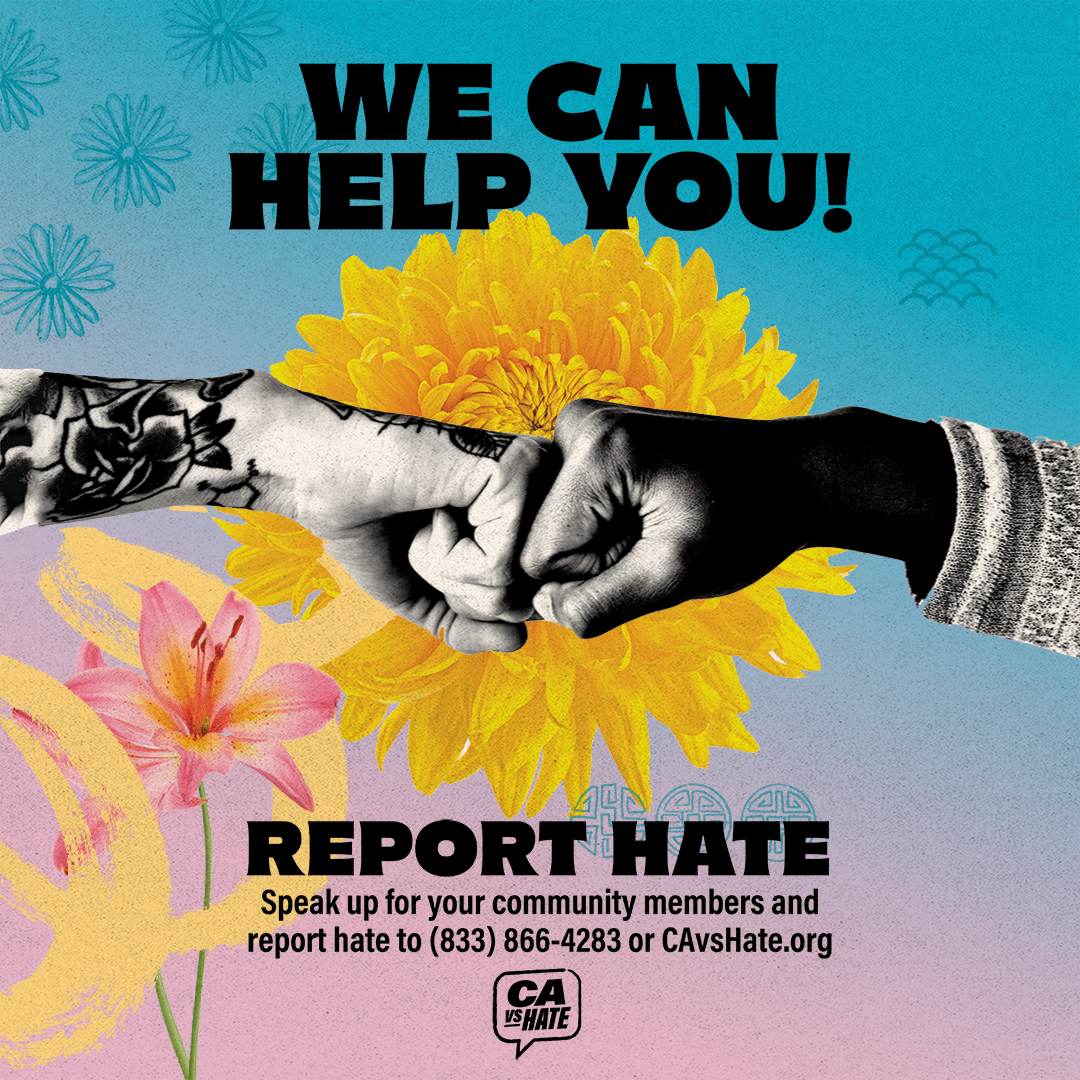The CA vs. Hate Statewide Anti-Hate Hotline- Controlling the Flow of Hate
News — By Buddy Sampson on May 28, 2024 at 3:00 pm
Cover and Inside photo- Hate is on the rise in California as well as in most of the nation. A victim of a hate crime? Call 833-8-NO-HATE.
By Buddy Sampson
Hatred. Bigotry. Prejudice. Hate Crimes. Hate crimes are on the rise, spreading fear and violence among oppressed communities, particularly the Black community. They resemble a tsunami, engulfing cities and states with waves of assaults, violence and murder. And, the state of California has not been immune to hate crimes, with 1,020 reported acts of hate in the last year.
The California Civil Rights Department (CRD) last year, alongside state and community partners, launched a Statewide Anti-Hate Hotline, in an effort to control the rising flow of hate crimes in California. Governor Gavin Newsom, along with the California Civil Rights Department (CRD) announced last year announced the official launch of CA vs. Hate, a multilingual statewide hotline and website that provides a safe, anonymous reporting- open for victims and witnesses of hate acts. CA vs. Hate is in direct response to the rise in reported hate crimes in California which in recent years, reached their highest levels since 2001- jumping almost 33% from 2020 to 2021.
“The most common reasons why people reported to us involved discriminatory treatment, followed by verbal harassment and derogatory names or slurs,” said Kevin Kish, Director, CRD. “The most common location, where these incidents occurred, were residential, meaning at home, in your apartment complex or around where you lived- followed by the workplace and public facilities.” In its first year, the anti-hate hotline tracked its calls and there were 1,020 verified reports of hate crimes.
It should come as no surprise that the number of hate crimes committed against persons of color—specifically, African Americans—far surpassed those of hate crimes committed against other ethnic groups. The Department of Justice, reported nationally, that 59.1% of hate crimes were because of Race/Ethnicity or Ancestry. Additionally, according to 2022 statistics, also from the Department of Justice, 51% of the offenders are White. “Race and ethnicity are the most cited bias motivation, and within race and ethnicity, anti-Black bias is by far the highest at more than a quarter of those reports, followed by anti- Latino bias, and Asian bias,” Kish explained. These are the incidents that are reported. Many racial incidents are not reported, because many people of color feel their perpetrators will go unpunished.

Many hate crimes have historically gone unreported due to a variety of factors, including fear of retaliation, lack of culturally competent resources, concern around potential immigration consequences, and distrust of law enforcement. CA vs Hate aims to help address some of these issues by offering people targeted for hate — and their communities — additional resources to report acts of hate through a community-centered approach that does not require engagement with the criminal legal system. Hotline services are confidential and provided for free, regardless of immigration status. CA vs Hate accepts all reports of hate and is not limited to only receiving reports that are criminal in nature. Whether individuals report to CA vs Hate online or by phone, they are eligible to receive ongoing care coordination to ensure people impacted by hate are able to access resources and support, including legal, financial, mental health, and mediation services. “We have more work to do to reach Californians that may be targeted to earn the trust necessary for people that feel like they can pick up the phone and contact the government,” said Kevin Kish. “So, we’re not done, and we’re not resting on our laurels. We’re continuing to strengthen this program.”

Regina Brown Wilson, Executive Director, California Black Media.
In order to address the spike in hate crimes, Regina Wilson, Executive Director of California Black Media, stressed the significance of having funding from the federal and state governments for websites and hotlines like CA vs. Hate. “The support from the California Department of Civil Rights, coupled with the California State Library Ethnic Media grants, have been a strategic and what I’d like to say, a smart use of state and Federal resources that have helped us advance in our common goal of reporting and reducing hate crimes in our communities,” said Regina Wilson. “These resources have enabled us to expand our Outreach efforts, produce impactful content and support cross-cultural engagement statewide. For example, our grant has allowed us to write stories to enable our media partners to inform communities about the various ethnic communities and mitigate hate incidences just because we get to learn about each other.”
California has taken the lead in reacting to the spike in recorded hate crimes in recent years by increasing grant funding, creating creative programs, and launching extensive outreach initiatives both within the state government and in partnership with community-based organizations. The success of CA Vs. Hate depends on these collaborations, whether they are made possible by the Ethnic Media Outreach Grants or the Stop the Hate Program. In order to improve access to resources for all of California’s various communities and to fortify the hotline’s statewide support network, CA vs. Hate is expanding its efforts.
“We’re proud that the CA vs. Hate project is a model for the nation,” said Regina Wilson.
Hate Crime reports can be made online at any time in 15 languages. People also can report an incident by calling (833) 866-4283 or 833-8-NO-HATE, Monday to Friday from 9 a.m. to 6 p.m., and talking to a trained civil rights agent in over 200 languages. Outside of those hours, people can leave a voicemail or call 211 to report a hate incident and seek support from a professional trained in culturally competent communication and trauma-informed practices.
Visit CAvsHate.org for more information.



 Tweet This
Tweet This Digg This
Digg This Save to delicious
Save to delicious Stumble it
Stumble it




